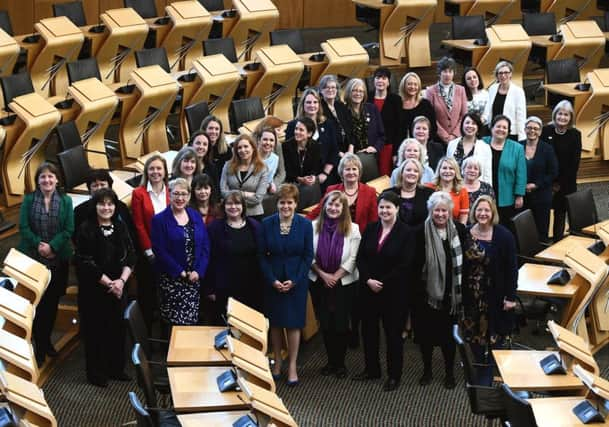Call for new law to make half of Scots political candidates women


The Electoral Reform Society (ERS) has said there should be legislation to ensure at least half of parties’ candidates are female when they fight Scottish and council elections.
The plea to increase the number of women at Holyrood and in town halls was made in the ERS’s submission to the Scottish Government’s consultation on electoral reform.
Advertisement
Hide AdAdvertisement
Hide AdDespite numerous pledges to achieve gender equality and a gradual increase in the number of women in public life, men still outnumber women in all tiers of Scottish politics.
Of the 129 MSPs at Holyrood, 46 are women – the equivalent of 36 per cent. Of the 59 MPs representing Scottish constituencies in the House of Commons, 17 (29 per cent) are women.
In local government, female representation reached its highest ever level in last year’s council elections, but women still only accounted for 29 per cent of councillors – 355 out of 1,227.
Political parties have had varied success in attracting women into elected politics – almost half (11 out of 23) Labour MSPs are female. In contrast all five Lib Dem MSPs are male.
Around 44 per cent of SNP MSPs are female (27 out of 62) while the Tories are a long way behind on 23 per cent (seven out of 31). The ERS submission said it backed a proposal by the pressure group Women 50:50 to create new legislation to achieve gender balance.
Willie Sullivan, ERS senior director, said: “We know that equality guarantees are the most effective way to ensure gender balance, and therefore we back Women 50:50’s call for new legislation ensuring all parties have to put forward at least 50 per cent women candidates in the Scottish Parliament and council elections.
“We also encourage continued efforts to ensure the devolution of electoral and equalities law to the Scottish Parliament. Should this happen we would urge the Scottish Government to explore the introduction of gender quotas for the Parliament.”
The submission included a rejection of Westminster’s plans to impose mandatory voter ID in an attempt to crack down on voter fraud. ERS argued such a move would disenfranchise disadvantaged communities where voters are less likely to have passports and driving licences.
Advertisement
Hide AdAdvertisement
Hide AdThe ERS also called for an increase in councillors to combat what it describes as a “crisis of local representation”.
It said: “This is about reviving our local areas with ‘community builders’ rather than simply distant councillors being points of complaint.”
The organisation is also keen to see weekend voting and a single electoral register to ensure people can vote at any polling station.
The SNP has introduced all-female candidate lists when a sitting MSP is standing down and gender-balanced regional list candidates.
SNP MSP Gail Ross said: “The SNP government has established a new £500,000 fund to support projects that encourage greater representation of women in politics and to mark the centenary of women’s suffrage.
“But we cannot be complacent and we need to continue to strive for gender equality until we live in a country, indeed until we live in a world, where no woman is held back because of their gender, and every woman is able to fulfil her potential.”
The Scottish Conservatives are opposed to quotas, but Annie Wells, Scottish Conservative equalities spokesman, said her party had put in place its own initiative to attract more women.
“It is important that our political establishment broadly reflects Scottish society, so much more must be done to encourage people from all backgrounds, religions, disabilities and genders to enter public life,” Ms Wells said.
Advertisement
Hide AdAdvertisement
Hide Ad“Scottish Conservatives encourage women into politics specifically through Women2Win, an organisation created to identify, recruit, assess, support and mentor female candidates.
“This SNP must begin now to reform education, improve access to and flexibility of childcare and tackle social attitudes if it truly wants to increase the number of women entering politics.”
Scottish Labour said that its candidate list for last year’s snap election had been 51 per cent male and 49 per cent female and was committed to all female shortlists. That compared with a male: female ratio of 68 per cent to 32 per cent in last year’s local elections. The 2016 Holyrood election saw Labour with 52 per cent female candidates.
Scottish Liberal Democrat leader Willie Rennie said: “It has certainly not gone unnoticed that I am male leader of an all-male parliamentary group. I recognise their talent but I am determined to use my leadership to change the composition of my parliamentary group for the future.”
A Scottish Government spokesperson said: “We are committed to ensuring access to democratic participation for all. Scotland led the way internationally by lowering the voting age to 16 – however we want to go further to ensure we make the democratic process and participation as fair and inclusive as possible.
“Our consultation on electoral reform will run until 29 March and the results will be published in due course.”